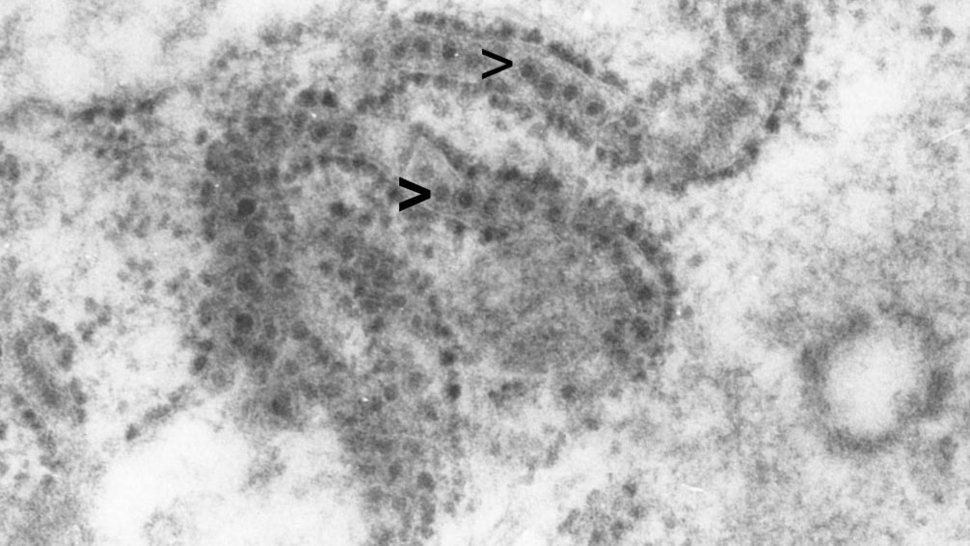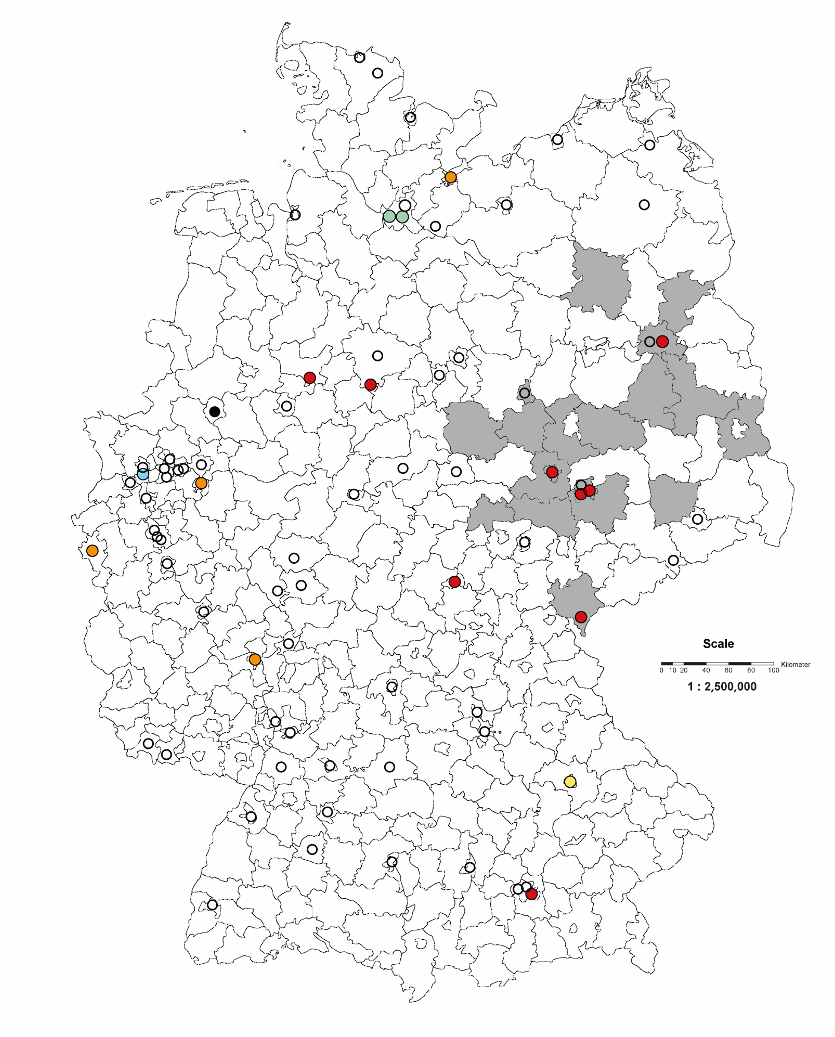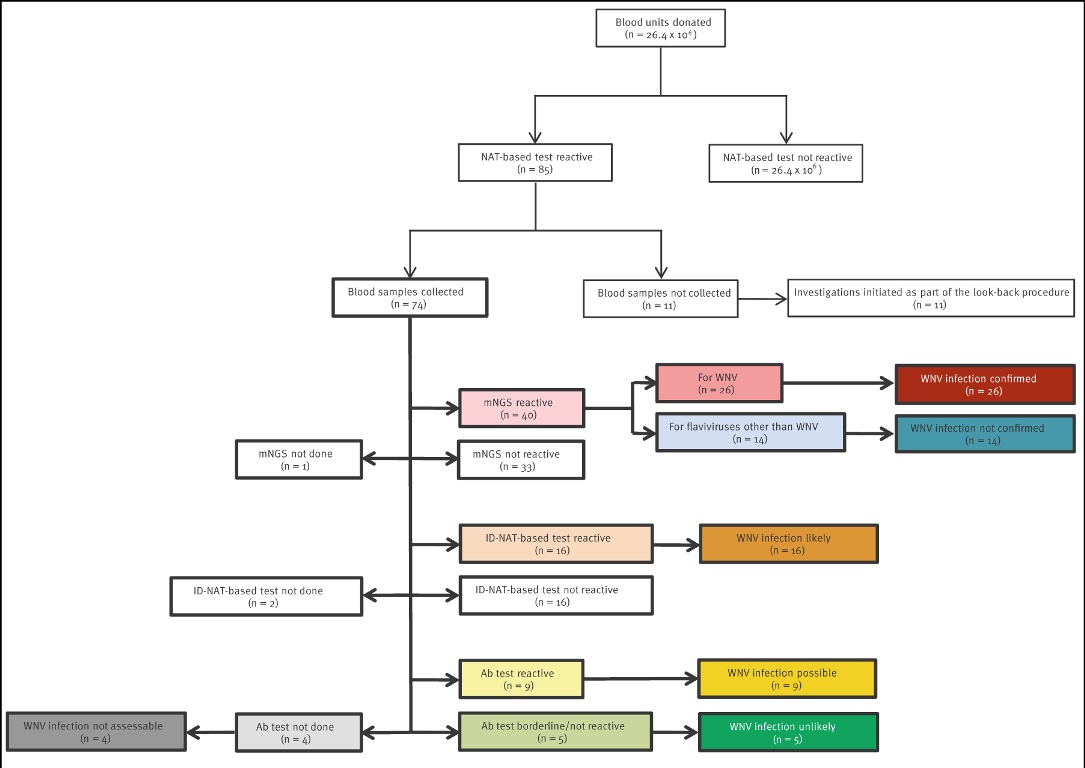West Nile virus: Largest European blood donation study confirms safety in transfusion medicine
Blood transfusions are among the safest life-saving measures in medicine. However, in more and more regions of Germany, people are becoming infected with West Nile virus (WNV). This also increases the risk of transmission through blood donations. The Bernhard Nocht Institute for Tropical Medicine (BNITM), the Paul Ehrlich Institute (PEI), and the University of Hamburg (UHH) have now investigated the benefits of WNV blood donation screening. They were able to show that the prescribed testing methods reliably detect WNV-infected donations and highly likely prevent transmission. Nevertheless, the researchers recommend continuous review of screening methods as the virus continues to spread in Germany. The results were published in the journal Eurosurveillance.

This is the largest study of its kind in Europe to date: Over a period of four years, researchers from the Bernhard Nocht Institute for Tropical Medicine (BNITM), the Paul Ehrlich Institute (PEI), and the University of Hamburg (UHH) conducted a national study to investigate whether current testing strategies in Germany effectively minimise the risk of West Nile virus transmission through blood products.

West Nile virus belongs to the Flavivirus family and is primarily transmitted by mosquitoes of the genus Culex. Birds are so-called amplification hosts, in whose blood large quantities of the virus can develop, allowing mosquitoes to ingest and spread it through blood feeding. Humans and other mammals, in contrast, are considered accidental hosts.
Infection is usually asymptomatic or causes flu-like symptoms. However, in about one percent of cases, severe neurological complications such as encephalitis can occur, particularly in elderly or immunocompromised individuals. In Germany, the virus was first detected in birds and horses in 2018, and in humans in 2019. Since then, it has been endemic, meaning firmly established, in several federal states, particularly in eastern Germany. The risk of transmission through blood transfusions exists because the virus is present even in asymptomatic infected individuals. In countries where West Nile virus is more common, isolated infections through blood products have been documented in the past. For example, WNV transmissions have already occurred in southern Europe and the USA, but not yet in Germany. There, blood donations have been postponed as a precautionary measure, or PCR tests have been conducted to minimise the risk of transmission. However, it was previously unclear whether the testing strategies used in Germany are reliable enough to reliably detect even small amounts of viral DNA.
Europe's largest study on blood donation safety
Between 2020 and 2023, the scientists analysed over 26 million blood donations from all 16 German federal states. They examined suspected cases reported to them by the blood donation services using modern diagnostic methods, including metagenomic sequencing and nucleic acid-based tests (NAT). The aim was to compare the sensitivity and specificity of the various test methods and to evaluate the effectiveness of the current measures.
The researchers examined 74 suspected cases in more detail. In 26 cases, they were able to detect the West Nile virus, but did not find any transmission through blood products. They also found that some test procedures occasionally cross-react with other related viruses such as the Usutu virus (USUV), human pegivirus type 2 and the Japanese encephalitis vaccine virus. Serological antibody tests proved to be unsuitable for early detection, while NAT-based tests reliably detected infection in the early stages.

The study validated a research method that the team was able to establish thanks to the BMBF-funded PREPMEDVET project and the CuliFo 3 research consortium: a so-called One-Health metagenomic NGS (Next Generation Sequencing) pipeline. This enabled the researchers in this project to quickly distinguish between WNV and USUV in conspicuous blood donor samples. CuliFo 3 is funded by the Federal Ministry of Food and Agriculture (BMEL).
BNITM expert warns: vigilance remains crucial
"Our study shows that the existing testing strategies currently effectively minimise the risk of virus transmission through blood products,’ says Dr Dániel Cadar, senior author of the study from the Bernhard Nocht Institute for Tropical Medicine. However, he adds, testing procedures should be regularly reviewed and, if necessary, adapted to respond to changes in virus prevalence. Metagenomic sequencing has proven to be a particularly promising diagnostic tool: ‘This method not only makes it possible to clarify suspected cases and accurately confirm WNV infections,’ explains Cadar. ‘It is also suitable for identifying other viruses that either show cross-reactions with classical molecular methods or cannot be reliably detected by them."

Since the West Nile virus will spread more widely in Germany as a result of climate change, the researchers recommend continuous monitoring of virus activity and, if necessary, an adaptation of testing strategies. In addition, future studies should further evaluate the effectiveness of rapid tests and new molecular methods to ensure the long-term safety of blood donations.
Original publication: Stefano Orru et al.: Assessment of the effectiveness of West Nile virus screening by analysing suspected positive donations among blood donors, Germany, 2020 to 2023. Eurosurveillance Vol. 30, Issue 8, Feb.2025. doi.org/10.2807/1560-7917.ES.2025.30.8.2400373
Downloads
Contact person
Dr Dániel Cadar
Research Group Leader
Phone : +49 40 285380-840
Fax : +49 40 285380-400
Email : cadar@bnitm.de
Julia Rauner
Public Relations
Phone : +49 40 285380-264
Email : presse@bnitm.de
Further information







